Unethical Job Cuts at NAB: A Case of Comparative Business Ethics & Social Responsibility
VerifiedAdded on 2022/11/26
|8
|1872
|218
AI Summary
This essay discusses the unethical job cuts at NAB and analyzes the case from the perspective of comparative business ethics and social responsibility. It explores the impact on employees, the violation of corporate governance principles, and the ethical theories applicable to the situation. The essay also suggests possible resolutions and highlights the legal implications of the job cuts.
Contribute Materials
Your contribution can guide someone’s learning journey. Share your
documents today.
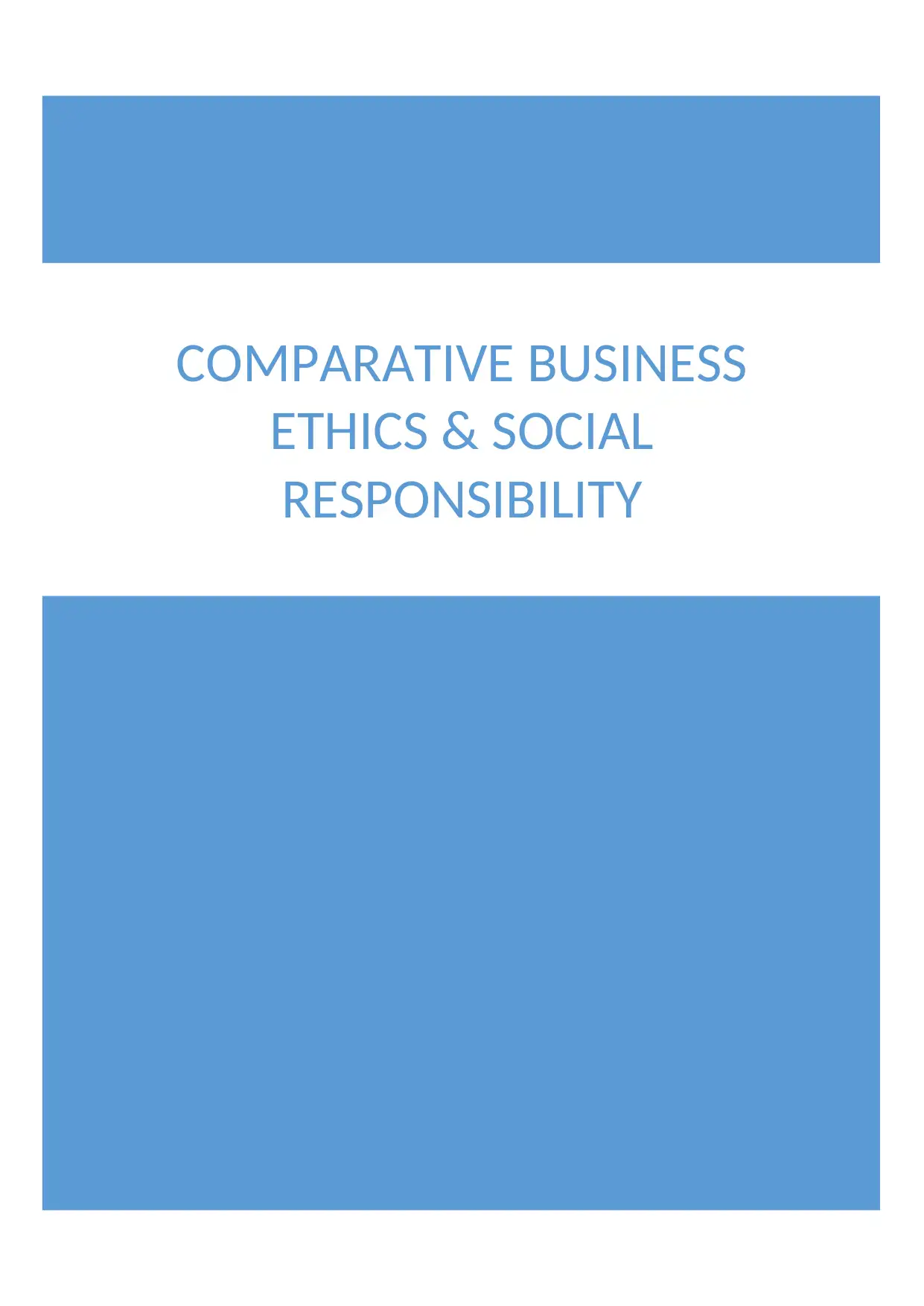
COMPARATIVE BUSINESS
ETHICS & SOCIAL
RESPONSIBILITY
ETHICS & SOCIAL
RESPONSIBILITY
Secure Best Marks with AI Grader
Need help grading? Try our AI Grader for instant feedback on your assignments.
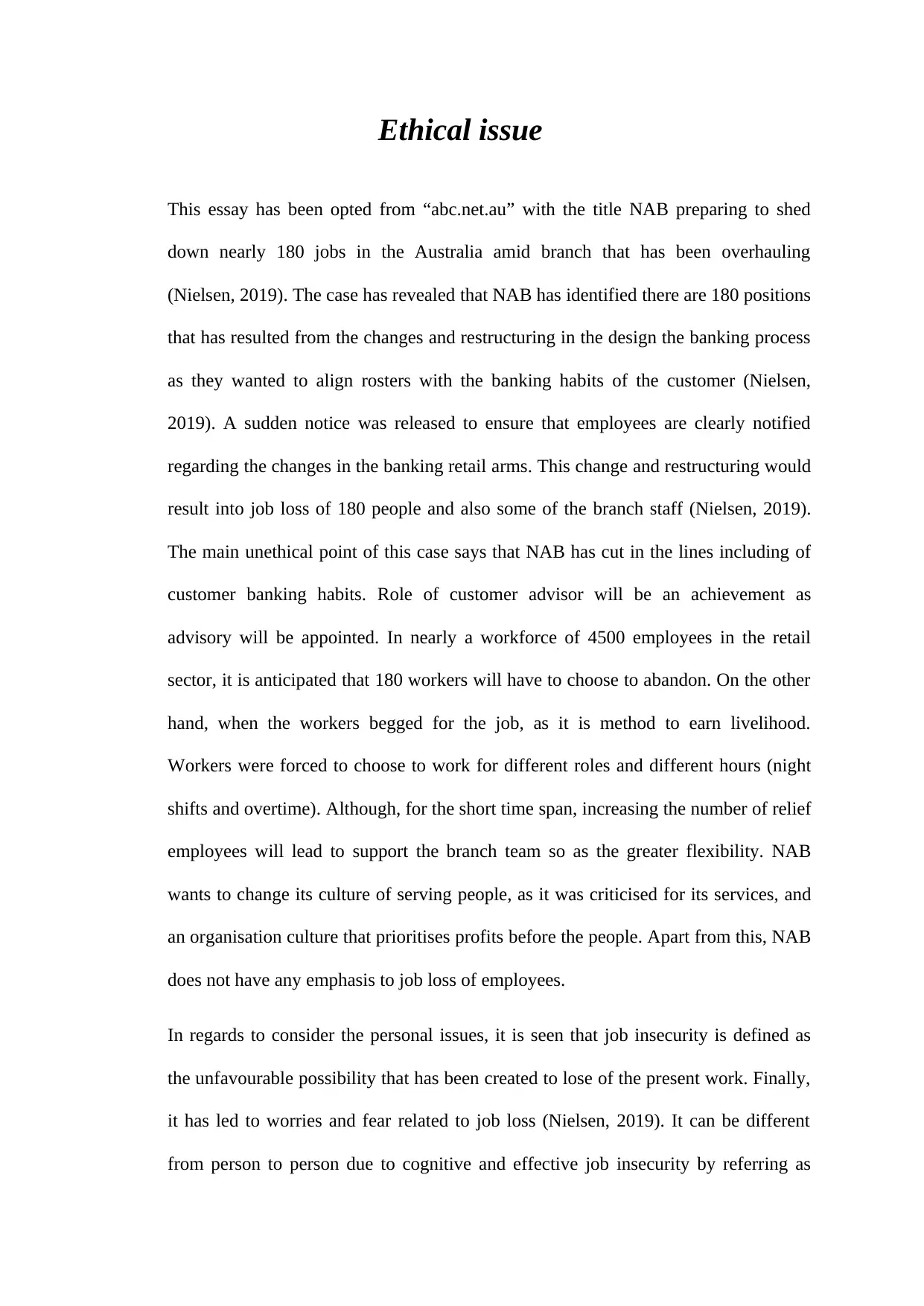
Ethical issue
This essay has been opted from “abc.net.au” with the title NAB preparing to shed
down nearly 180 jobs in the Australia amid branch that has been overhauling
(Nielsen, 2019). The case has revealed that NAB has identified there are 180 positions
that has resulted from the changes and restructuring in the design the banking process
as they wanted to align rosters with the banking habits of the customer (Nielsen,
2019). A sudden notice was released to ensure that employees are clearly notified
regarding the changes in the banking retail arms. This change and restructuring would
result into job loss of 180 people and also some of the branch staff (Nielsen, 2019).
The main unethical point of this case says that NAB has cut in the lines including of
customer banking habits. Role of customer advisor will be an achievement as
advisory will be appointed. In nearly a workforce of 4500 employees in the retail
sector, it is anticipated that 180 workers will have to choose to abandon. On the other
hand, when the workers begged for the job, as it is method to earn livelihood.
Workers were forced to choose to work for different roles and different hours (night
shifts and overtime). Although, for the short time span, increasing the number of relief
employees will lead to support the branch team so as the greater flexibility. NAB
wants to change its culture of serving people, as it was criticised for its services, and
an organisation culture that prioritises profits before the people. Apart from this, NAB
does not have any emphasis to job loss of employees.
In regards to consider the personal issues, it is seen that job insecurity is defined as
the unfavourable possibility that has been created to lose of the present work. Finally,
it has led to worries and fear related to job loss (Nielsen, 2019). It can be different
from person to person due to cognitive and effective job insecurity by referring as
This essay has been opted from “abc.net.au” with the title NAB preparing to shed
down nearly 180 jobs in the Australia amid branch that has been overhauling
(Nielsen, 2019). The case has revealed that NAB has identified there are 180 positions
that has resulted from the changes and restructuring in the design the banking process
as they wanted to align rosters with the banking habits of the customer (Nielsen,
2019). A sudden notice was released to ensure that employees are clearly notified
regarding the changes in the banking retail arms. This change and restructuring would
result into job loss of 180 people and also some of the branch staff (Nielsen, 2019).
The main unethical point of this case says that NAB has cut in the lines including of
customer banking habits. Role of customer advisor will be an achievement as
advisory will be appointed. In nearly a workforce of 4500 employees in the retail
sector, it is anticipated that 180 workers will have to choose to abandon. On the other
hand, when the workers begged for the job, as it is method to earn livelihood.
Workers were forced to choose to work for different roles and different hours (night
shifts and overtime). Although, for the short time span, increasing the number of relief
employees will lead to support the branch team so as the greater flexibility. NAB
wants to change its culture of serving people, as it was criticised for its services, and
an organisation culture that prioritises profits before the people. Apart from this, NAB
does not have any emphasis to job loss of employees.
In regards to consider the personal issues, it is seen that job insecurity is defined as
the unfavourable possibility that has been created to lose of the present work. Finally,
it has led to worries and fear related to job loss (Nielsen, 2019). It can be different
from person to person due to cognitive and effective job insecurity by referring as
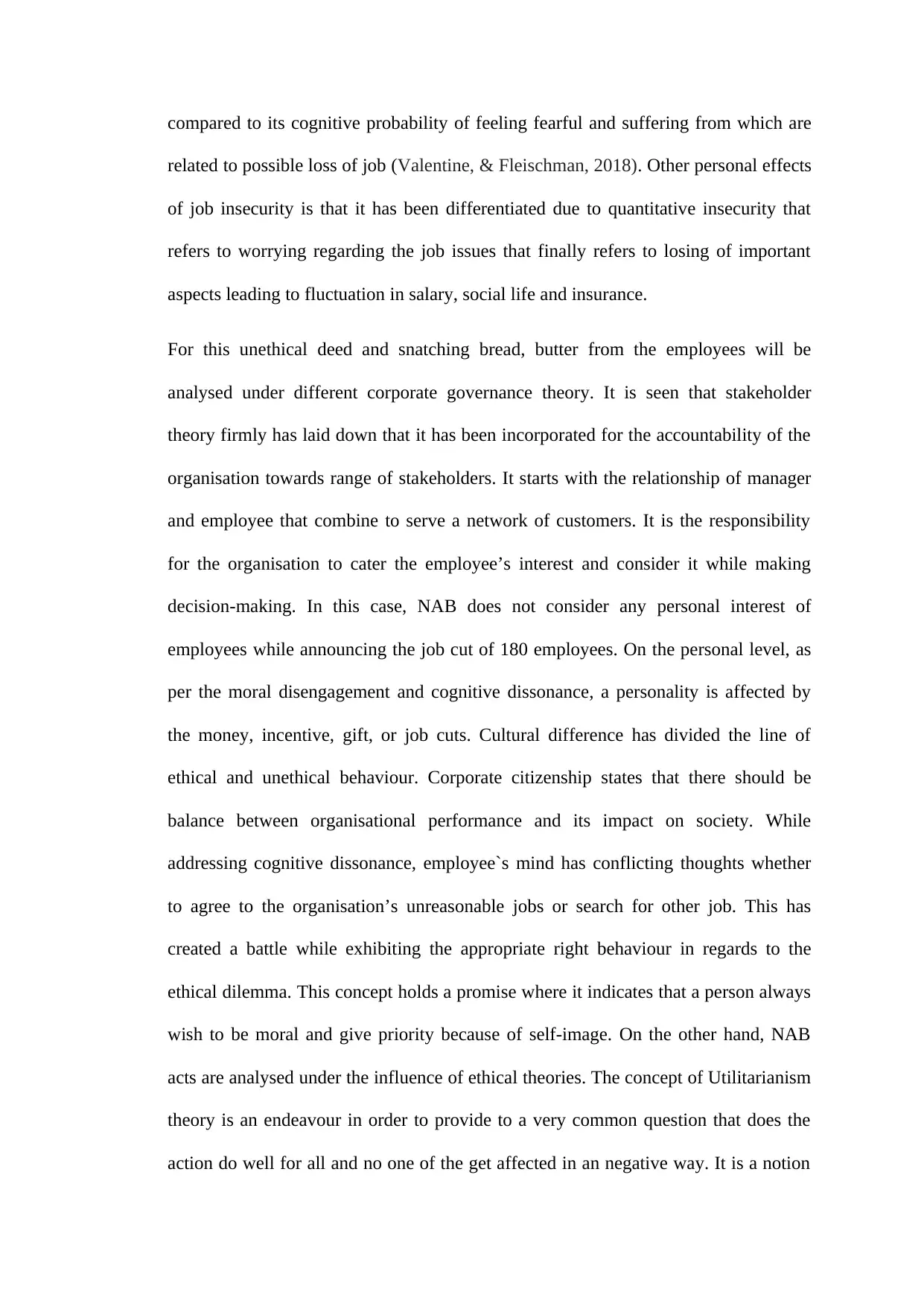
compared to its cognitive probability of feeling fearful and suffering from which are
related to possible loss of job (Valentine, & Fleischman, 2018). Other personal effects
of job insecurity is that it has been differentiated due to quantitative insecurity that
refers to worrying regarding the job issues that finally refers to losing of important
aspects leading to fluctuation in salary, social life and insurance.
For this unethical deed and snatching bread, butter from the employees will be
analysed under different corporate governance theory. It is seen that stakeholder
theory firmly has laid down that it has been incorporated for the accountability of the
organisation towards range of stakeholders. It starts with the relationship of manager
and employee that combine to serve a network of customers. It is the responsibility
for the organisation to cater the employee’s interest and consider it while making
decision-making. In this case, NAB does not consider any personal interest of
employees while announcing the job cut of 180 employees. On the personal level, as
per the moral disengagement and cognitive dissonance, a personality is affected by
the money, incentive, gift, or job cuts. Cultural difference has divided the line of
ethical and unethical behaviour. Corporate citizenship states that there should be
balance between organisational performance and its impact on society. While
addressing cognitive dissonance, employee`s mind has conflicting thoughts whether
to agree to the organisation’s unreasonable jobs or search for other job. This has
created a battle while exhibiting the appropriate right behaviour in regards to the
ethical dilemma. This concept holds a promise where it indicates that a person always
wish to be moral and give priority because of self-image. On the other hand, NAB
acts are analysed under the influence of ethical theories. The concept of Utilitarianism
theory is an endeavour in order to provide to a very common question that does the
action do well for all and no one of the get affected in an negative way. It is a notion
related to possible loss of job (Valentine, & Fleischman, 2018). Other personal effects
of job insecurity is that it has been differentiated due to quantitative insecurity that
refers to worrying regarding the job issues that finally refers to losing of important
aspects leading to fluctuation in salary, social life and insurance.
For this unethical deed and snatching bread, butter from the employees will be
analysed under different corporate governance theory. It is seen that stakeholder
theory firmly has laid down that it has been incorporated for the accountability of the
organisation towards range of stakeholders. It starts with the relationship of manager
and employee that combine to serve a network of customers. It is the responsibility
for the organisation to cater the employee’s interest and consider it while making
decision-making. In this case, NAB does not consider any personal interest of
employees while announcing the job cut of 180 employees. On the personal level, as
per the moral disengagement and cognitive dissonance, a personality is affected by
the money, incentive, gift, or job cuts. Cultural difference has divided the line of
ethical and unethical behaviour. Corporate citizenship states that there should be
balance between organisational performance and its impact on society. While
addressing cognitive dissonance, employee`s mind has conflicting thoughts whether
to agree to the organisation’s unreasonable jobs or search for other job. This has
created a battle while exhibiting the appropriate right behaviour in regards to the
ethical dilemma. This concept holds a promise where it indicates that a person always
wish to be moral and give priority because of self-image. On the other hand, NAB
acts are analysed under the influence of ethical theories. The concept of Utilitarianism
theory is an endeavour in order to provide to a very common question that does the
action do well for all and no one of the get affected in an negative way. It is a notion
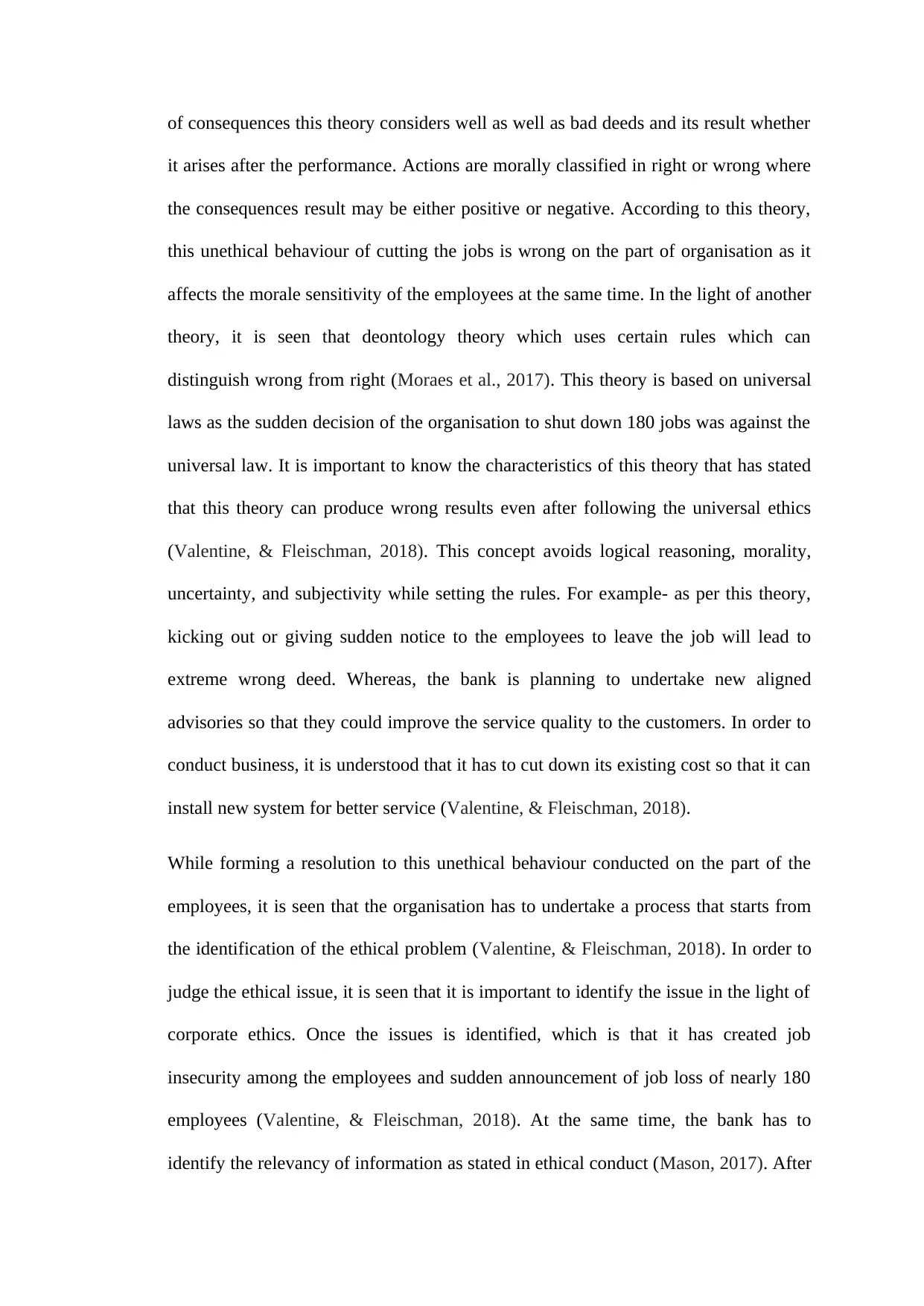
of consequences this theory considers well as well as bad deeds and its result whether
it arises after the performance. Actions are morally classified in right or wrong where
the consequences result may be either positive or negative. According to this theory,
this unethical behaviour of cutting the jobs is wrong on the part of organisation as it
affects the morale sensitivity of the employees at the same time. In the light of another
theory, it is seen that deontology theory which uses certain rules which can
distinguish wrong from right (Moraes et al., 2017). This theory is based on universal
laws as the sudden decision of the organisation to shut down 180 jobs was against the
universal law. It is important to know the characteristics of this theory that has stated
that this theory can produce wrong results even after following the universal ethics
(Valentine, & Fleischman, 2018). This concept avoids logical reasoning, morality,
uncertainty, and subjectivity while setting the rules. For example- as per this theory,
kicking out or giving sudden notice to the employees to leave the job will lead to
extreme wrong deed. Whereas, the bank is planning to undertake new aligned
advisories so that they could improve the service quality to the customers. In order to
conduct business, it is understood that it has to cut down its existing cost so that it can
install new system for better service (Valentine, & Fleischman, 2018).
While forming a resolution to this unethical behaviour conducted on the part of the
employees, it is seen that the organisation has to undertake a process that starts from
the identification of the ethical problem (Valentine, & Fleischman, 2018). In order to
judge the ethical issue, it is seen that it is important to identify the issue in the light of
corporate ethics. Once the issues is identified, which is that it has created job
insecurity among the employees and sudden announcement of job loss of nearly 180
employees (Valentine, & Fleischman, 2018). At the same time, the bank has to
identify the relevancy of information as stated in ethical conduct (Mason, 2017). After
it arises after the performance. Actions are morally classified in right or wrong where
the consequences result may be either positive or negative. According to this theory,
this unethical behaviour of cutting the jobs is wrong on the part of organisation as it
affects the morale sensitivity of the employees at the same time. In the light of another
theory, it is seen that deontology theory which uses certain rules which can
distinguish wrong from right (Moraes et al., 2017). This theory is based on universal
laws as the sudden decision of the organisation to shut down 180 jobs was against the
universal law. It is important to know the characteristics of this theory that has stated
that this theory can produce wrong results even after following the universal ethics
(Valentine, & Fleischman, 2018). This concept avoids logical reasoning, morality,
uncertainty, and subjectivity while setting the rules. For example- as per this theory,
kicking out or giving sudden notice to the employees to leave the job will lead to
extreme wrong deed. Whereas, the bank is planning to undertake new aligned
advisories so that they could improve the service quality to the customers. In order to
conduct business, it is understood that it has to cut down its existing cost so that it can
install new system for better service (Valentine, & Fleischman, 2018).
While forming a resolution to this unethical behaviour conducted on the part of the
employees, it is seen that the organisation has to undertake a process that starts from
the identification of the ethical problem (Valentine, & Fleischman, 2018). In order to
judge the ethical issue, it is seen that it is important to identify the issue in the light of
corporate ethics. Once the issues is identified, which is that it has created job
insecurity among the employees and sudden announcement of job loss of nearly 180
employees (Valentine, & Fleischman, 2018). At the same time, the bank has to
identify the relevancy of information as stated in ethical conduct (Mason, 2017). After
Secure Best Marks with AI Grader
Need help grading? Try our AI Grader for instant feedback on your assignments.
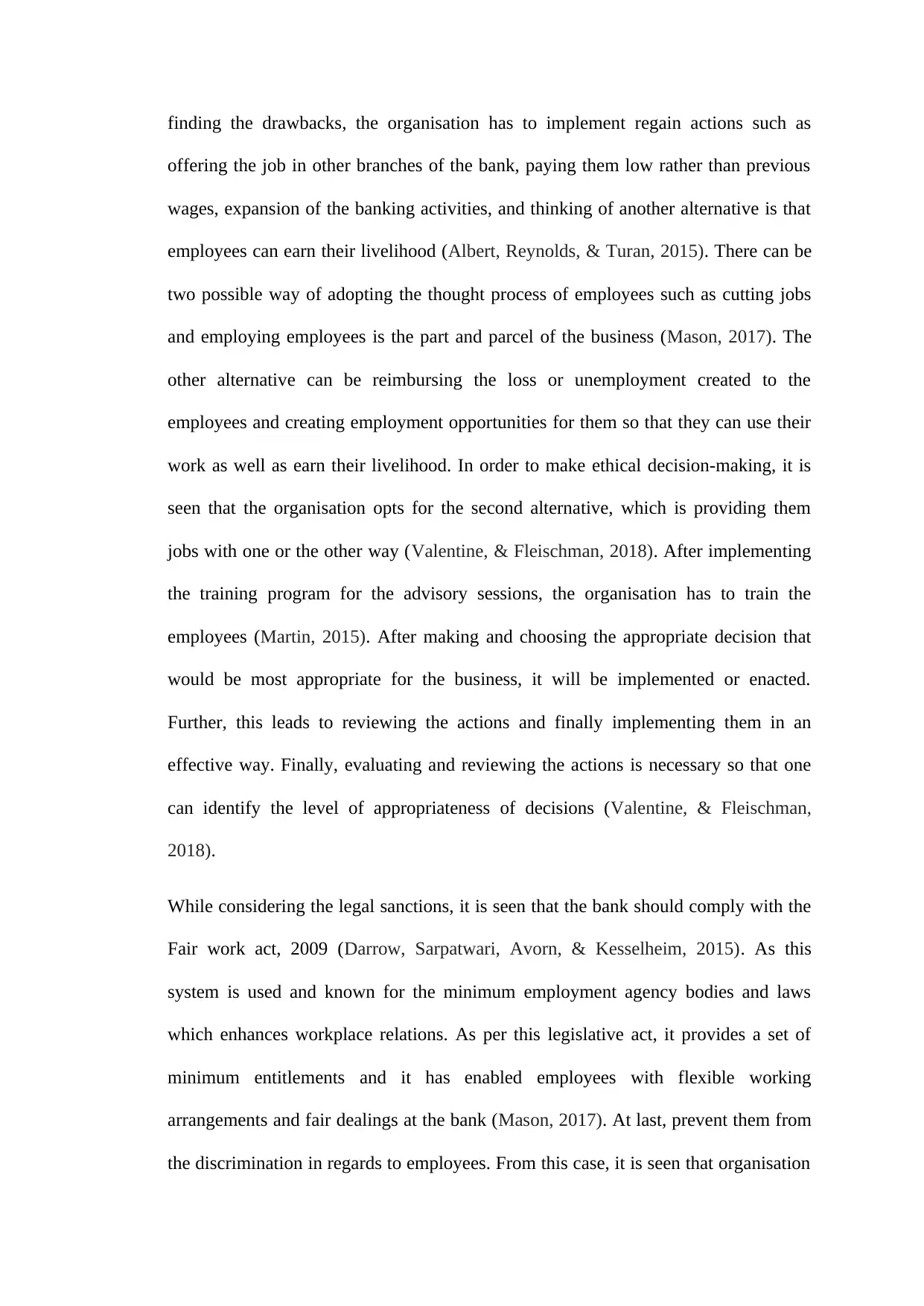
finding the drawbacks, the organisation has to implement regain actions such as
offering the job in other branches of the bank, paying them low rather than previous
wages, expansion of the banking activities, and thinking of another alternative is that
employees can earn their livelihood (Albert, Reynolds, & Turan, 2015). There can be
two possible way of adopting the thought process of employees such as cutting jobs
and employing employees is the part and parcel of the business (Mason, 2017). The
other alternative can be reimbursing the loss or unemployment created to the
employees and creating employment opportunities for them so that they can use their
work as well as earn their livelihood. In order to make ethical decision-making, it is
seen that the organisation opts for the second alternative, which is providing them
jobs with one or the other way (Valentine, & Fleischman, 2018). After implementing
the training program for the advisory sessions, the organisation has to train the
employees (Martin, 2015). After making and choosing the appropriate decision that
would be most appropriate for the business, it will be implemented or enacted.
Further, this leads to reviewing the actions and finally implementing them in an
effective way. Finally, evaluating and reviewing the actions is necessary so that one
can identify the level of appropriateness of decisions (Valentine, & Fleischman,
2018).
While considering the legal sanctions, it is seen that the bank should comply with the
Fair work act, 2009 (Darrow, Sarpatwari, Avorn, & Kesselheim, 2015). As this
system is used and known for the minimum employment agency bodies and laws
which enhances workplace relations. As per this legislative act, it provides a set of
minimum entitlements and it has enabled employees with flexible working
arrangements and fair dealings at the bank (Mason, 2017). At last, prevent them from
the discrimination in regards to employees. From this case, it is seen that organisation
offering the job in other branches of the bank, paying them low rather than previous
wages, expansion of the banking activities, and thinking of another alternative is that
employees can earn their livelihood (Albert, Reynolds, & Turan, 2015). There can be
two possible way of adopting the thought process of employees such as cutting jobs
and employing employees is the part and parcel of the business (Mason, 2017). The
other alternative can be reimbursing the loss or unemployment created to the
employees and creating employment opportunities for them so that they can use their
work as well as earn their livelihood. In order to make ethical decision-making, it is
seen that the organisation opts for the second alternative, which is providing them
jobs with one or the other way (Valentine, & Fleischman, 2018). After implementing
the training program for the advisory sessions, the organisation has to train the
employees (Martin, 2015). After making and choosing the appropriate decision that
would be most appropriate for the business, it will be implemented or enacted.
Further, this leads to reviewing the actions and finally implementing them in an
effective way. Finally, evaluating and reviewing the actions is necessary so that one
can identify the level of appropriateness of decisions (Valentine, & Fleischman,
2018).
While considering the legal sanctions, it is seen that the bank should comply with the
Fair work act, 2009 (Darrow, Sarpatwari, Avorn, & Kesselheim, 2015). As this
system is used and known for the minimum employment agency bodies and laws
which enhances workplace relations. As per this legislative act, it provides a set of
minimum entitlements and it has enabled employees with flexible working
arrangements and fair dealings at the bank (Mason, 2017). At last, prevent them from
the discrimination in regards to employees. From this case, it is seen that organisation
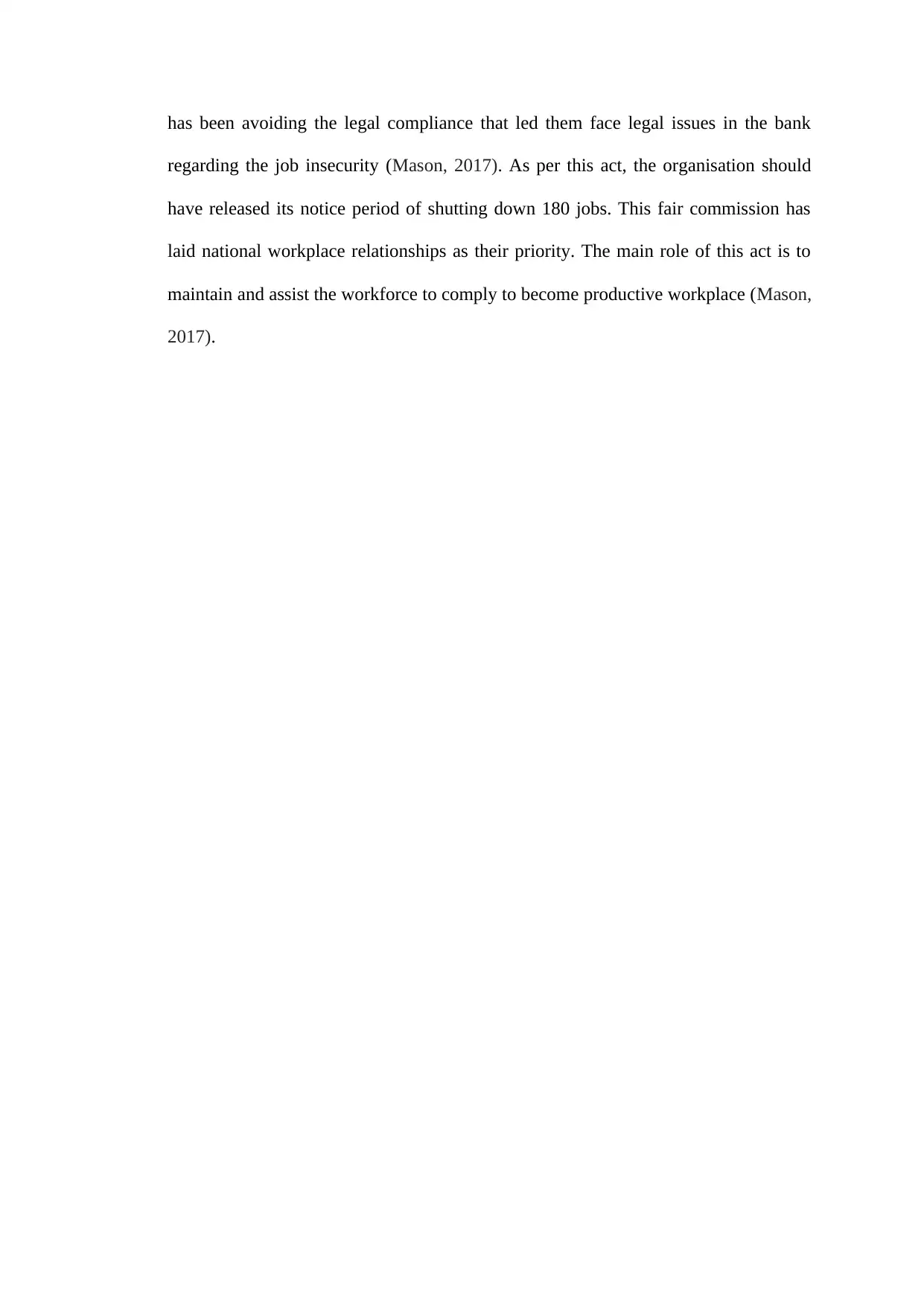
has been avoiding the legal compliance that led them face legal issues in the bank
regarding the job insecurity (Mason, 2017). As per this act, the organisation should
have released its notice period of shutting down 180 jobs. This fair commission has
laid national workplace relationships as their priority. The main role of this act is to
maintain and assist the workforce to comply to become productive workplace (Mason,
2017).
regarding the job insecurity (Mason, 2017). As per this act, the organisation should
have released its notice period of shutting down 180 jobs. This fair commission has
laid national workplace relationships as their priority. The main role of this act is to
maintain and assist the workforce to comply to become productive workplace (Mason,
2017).
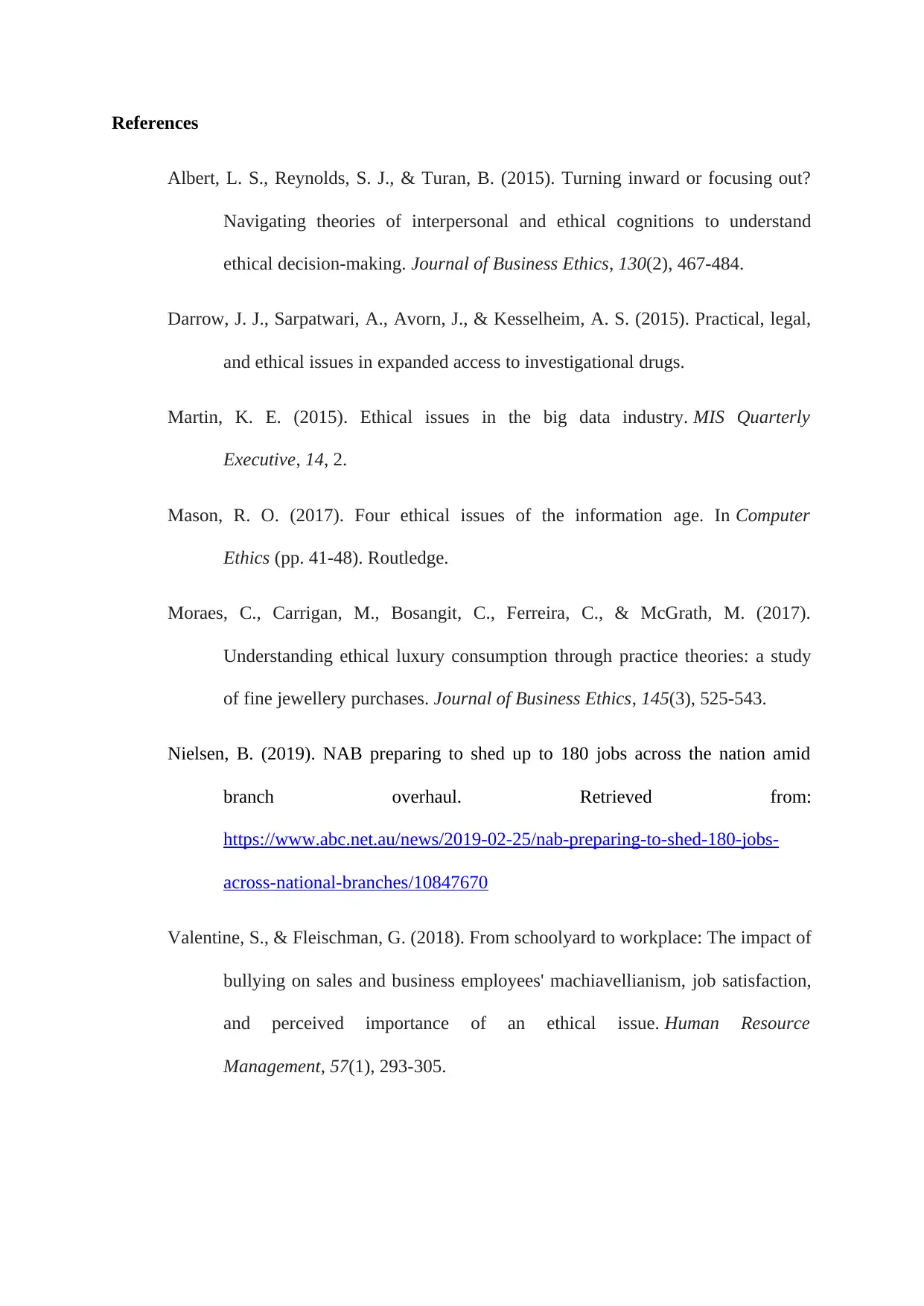
References
Albert, L. S., Reynolds, S. J., & Turan, B. (2015). Turning inward or focusing out?
Navigating theories of interpersonal and ethical cognitions to understand
ethical decision-making. Journal of Business Ethics, 130(2), 467-484.
Darrow, J. J., Sarpatwari, A., Avorn, J., & Kesselheim, A. S. (2015). Practical, legal,
and ethical issues in expanded access to investigational drugs.
Martin, K. E. (2015). Ethical issues in the big data industry. MIS Quarterly
Executive, 14, 2.
Mason, R. O. (2017). Four ethical issues of the information age. In Computer
Ethics (pp. 41-48). Routledge.
Moraes, C., Carrigan, M., Bosangit, C., Ferreira, C., & McGrath, M. (2017).
Understanding ethical luxury consumption through practice theories: a study
of fine jewellery purchases. Journal of Business Ethics, 145(3), 525-543.
Nielsen, B. (2019). NAB preparing to shed up to 180 jobs across the nation amid
branch overhaul. Retrieved from:
https://www.abc.net.au/news/2019-02-25/nab-preparing-to-shed-180-jobs-
across-national-branches/10847670
Valentine, S., & Fleischman, G. (2018). From schoolyard to workplace: The impact of
bullying on sales and business employees' machiavellianism, job satisfaction,
and perceived importance of an ethical issue. Human Resource
Management, 57(1), 293-305.
Albert, L. S., Reynolds, S. J., & Turan, B. (2015). Turning inward or focusing out?
Navigating theories of interpersonal and ethical cognitions to understand
ethical decision-making. Journal of Business Ethics, 130(2), 467-484.
Darrow, J. J., Sarpatwari, A., Avorn, J., & Kesselheim, A. S. (2015). Practical, legal,
and ethical issues in expanded access to investigational drugs.
Martin, K. E. (2015). Ethical issues in the big data industry. MIS Quarterly
Executive, 14, 2.
Mason, R. O. (2017). Four ethical issues of the information age. In Computer
Ethics (pp. 41-48). Routledge.
Moraes, C., Carrigan, M., Bosangit, C., Ferreira, C., & McGrath, M. (2017).
Understanding ethical luxury consumption through practice theories: a study
of fine jewellery purchases. Journal of Business Ethics, 145(3), 525-543.
Nielsen, B. (2019). NAB preparing to shed up to 180 jobs across the nation amid
branch overhaul. Retrieved from:
https://www.abc.net.au/news/2019-02-25/nab-preparing-to-shed-180-jobs-
across-national-branches/10847670
Valentine, S., & Fleischman, G. (2018). From schoolyard to workplace: The impact of
bullying on sales and business employees' machiavellianism, job satisfaction,
and perceived importance of an ethical issue. Human Resource
Management, 57(1), 293-305.
Paraphrase This Document
Need a fresh take? Get an instant paraphrase of this document with our AI Paraphraser
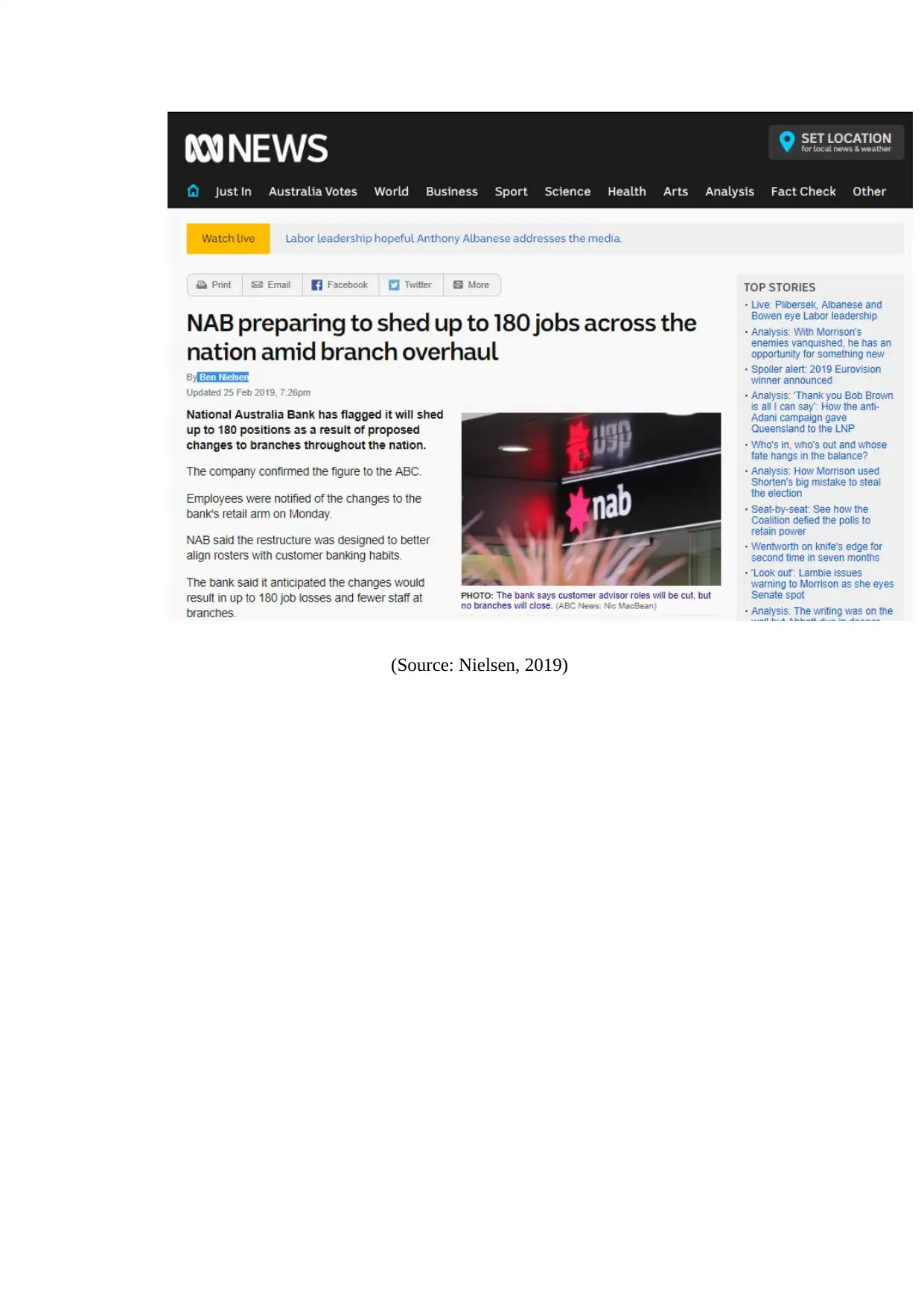
(Source: Nielsen, 2019)
1 out of 8
Your All-in-One AI-Powered Toolkit for Academic Success.
+13062052269
info@desklib.com
Available 24*7 on WhatsApp / Email
![[object Object]](/_next/static/media/star-bottom.7253800d.svg)
Unlock your academic potential
© 2024 | Zucol Services PVT LTD | All rights reserved.